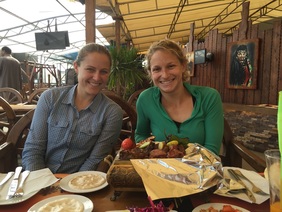
We have been in Egypt for only 4 days now it has been quite a trip so far. Six Barn swallows in a bucket, no sleep, mobs of children, military check-points, delicious food, Bedouins, and a close encounter with a pretty terrified cow. We are doing fieldwork in the city of Damietta on the Nile delta. We are staying in new Damietta, but we are catching most of our swallows in old Damietta, and by old we mean pharaohs, and in the surrounding villages. There is an amazing level of construction here in new Damietta- miles and miles of new apartment buildings going up. The architecture is colorful and almost whimsical with lots of curves and arches. It is impressive to see.
Basma and her husband Mamdouh have been wonderful hosts. They are eager to help us find the swallows and we could not possibly do this without them. This is not an easy place to work as a foreigner not knowing the language or customs, so they are invaluable. The last few days have been filled with searching and some trail and error as we have honed in on where the swallows are and how best to catch them. Swallows tend to be in old parts of the city, particularly where there is mud and animals because this means building material for nests and insects to eat. It takes them a while to settle in newly constructed areas in high density, meaning our nest searching in new Damietta did not turn up anything. Our walk through some of the residential areas did result in us being followed by 8 or so very curious 10-12 year old boys for several blocks. There were kissing sounds, giggling, and one brave one attempted to subtly throw a kickball at us. We tried very hard to ignore them and not encourage them, and eventually an elderly woman sharply told them off and they scattered. We were grateful and she smiled and spoke to us in french.
For her avian flu work, Basma often bands birds in reed beds and has caught barn swallows there in the past. We decided to give it a try and set up our mist nets by reed beds near a fish farm. The man who owned the place let us set up shop in a little house near the reeds and we spent the day there. We did not catch any barn swallows, but the whole thing was very pleasant. We did catch a graceful prinia and a reed warbler despite it being pretty windy.
For her avian flu work, Basma often bands birds in reed beds and has caught barn swallows there in the past. We decided to give it a try and set up our mist nets by reed beds near a fish farm. The man who owned the place let us set up shop in a little house near the reeds and we spent the day there. We did not catch any barn swallows, but the whole thing was very pleasant. We did catch a graceful prinia and a reed warbler despite it being pretty windy.
With our lack of barn swallows in new Damietta and the reed beds, Basma started asking around to see if people knew of nests. Liz and I were awoken early the next morning by a frantic call from Basma saying someone had 10 barn swallows for us. We knew nothing about who or why or how they had caught the swallows, if they were actually barn swallows (or martins that kind of look like barn swallows), and if they were alive, but we grabbed our gear and went. Turns out the friendly fish farmer had heard Basma worrying about finding barn swallows the day before so went back to his village that night and grabbed 6 barn swallows off of their nests while they were roosting at night and put them in a bucket with a lid (and even thoughtfully punched holes in it). The birds were alive when we got there, but wet, covered with poop, and clearly not happy about being stuck in a bucket with each other (barn swallows are very territorial). We also had some with several missing tail feathers- I imagine they were lost in the process of the man grabbing them. It was so nice of him though and we were very grateful. He clearly wanted to help us. We measured the 6 soggy swallows and sent them on their way. Bucket o’ barn swallows anyone?
That night Basma was on board with finding nests and we went to a village outside of the city where a friend of hers had a nest in his shop. As soon as we arrived the place turned into commotion and chaos. This is a place the basically never sees foreigners, and lets face it- even with Liz and I are wearing loose, covering clothes, there is simply no way we are ever going to blend in, at all. We soon were surrounded by a mob of children. A man passing by asked what we were doing and when he found out we were looking for swallows led us to his barn down the street, which had 5 active nests in it. It was a cramped space filled with sheep and two cows. While we set up nets the kids were outside- held back by some flimsy doors. They were all shouting and banging on the door and building – it was so loud, and every time we caught a swallow they all cheered. Several came in and we had to stop them from touching the birds in the nets. At one point Mamdouh and I carefully set up a net basically on top of a terrified cow that was tied right under a nest with two birds in it. We eventually captured 5 of the birds and were shepherded through the streets with Basma and Mamdouh acting like bodyguards. We caught one more pair that night in a stairwell of an apartment building in old Damietta near the Nile. We had gone from no birds to 15 and were off and running. Sorry I don’t have more pictures- it was not exactly the time or place to stop and pull out a camera.
That night Basma was on board with finding nests and we went to a village outside of the city where a friend of hers had a nest in his shop. As soon as we arrived the place turned into commotion and chaos. This is a place the basically never sees foreigners, and lets face it- even with Liz and I are wearing loose, covering clothes, there is simply no way we are ever going to blend in, at all. We soon were surrounded by a mob of children. A man passing by asked what we were doing and when he found out we were looking for swallows led us to his barn down the street, which had 5 active nests in it. It was a cramped space filled with sheep and two cows. While we set up nets the kids were outside- held back by some flimsy doors. They were all shouting and banging on the door and building – it was so loud, and every time we caught a swallow they all cheered. Several came in and we had to stop them from touching the birds in the nets. At one point Mamdouh and I carefully set up a net basically on top of a terrified cow that was tied right under a nest with two birds in it. We eventually captured 5 of the birds and were shepherded through the streets with Basma and Mamdouh acting like bodyguards. We caught one more pair that night in a stairwell of an apartment building in old Damietta near the Nile. We had gone from no birds to 15 and were off and running. Sorry I don’t have more pictures- it was not exactly the time or place to stop and pull out a camera.
A few more comments about Egypt in general. People do not believe in sleep here. They are up late at night and early in the morning. This must be made possible by all the tea and strong coffee that they drink. In order to survive I think they must also take naps, it is the only explanation. Between jet lag and fieldwork, Liz and I are exhausted. It feels a bit like we are under water.
We have been able to try some great Egyptian food. Basma had us over for dinner the other night and cooked lots of amazing traditional food for us. Meat soup with orzo (which they call sparrow tongue macaroni here), an amazing eggplant, tomato and pepper dish (my favorite), meat and vegetable tagine, salad, rice, and Egyptian flat bread. After our barn swallow in a bucket adventure we also went to their house for breakfast and had homemade falafel, broad bean dip, eggs, and fresh cheese. The Egyptian way is to offer (often forcibly) lots of food to your guests and I think, basically, try and get them to eat as much as possible. There seems to be a number of similarities with food pushing practices in rural Minnesota. Basma spent several years in America and goes easy on us when it comes to pushing food, but described what it would usually be like. The other day Liz and I ventured out for lunch by ourselves and with lots of pointing and gesturing managed to communicate “small chicken”, we were very proud of ourselves when they presented us with grilled chicken on a bed of rice and salad, hummus, bread and pickles! When we went to pay, the men seemed quite flustered and ended up charging us only $6 for everything, which must have been wrong.
We have been able to try some great Egyptian food. Basma had us over for dinner the other night and cooked lots of amazing traditional food for us. Meat soup with orzo (which they call sparrow tongue macaroni here), an amazing eggplant, tomato and pepper dish (my favorite), meat and vegetable tagine, salad, rice, and Egyptian flat bread. After our barn swallow in a bucket adventure we also went to their house for breakfast and had homemade falafel, broad bean dip, eggs, and fresh cheese. The Egyptian way is to offer (often forcibly) lots of food to your guests and I think, basically, try and get them to eat as much as possible. There seems to be a number of similarities with food pushing practices in rural Minnesota. Basma spent several years in America and goes easy on us when it comes to pushing food, but described what it would usually be like. The other day Liz and I ventured out for lunch by ourselves and with lots of pointing and gesturing managed to communicate “small chicken”, we were very proud of ourselves when they presented us with grilled chicken on a bed of rice and salad, hummus, bread and pickles! When we went to pay, the men seemed quite flustered and ended up charging us only $6 for everything, which must have been wrong.
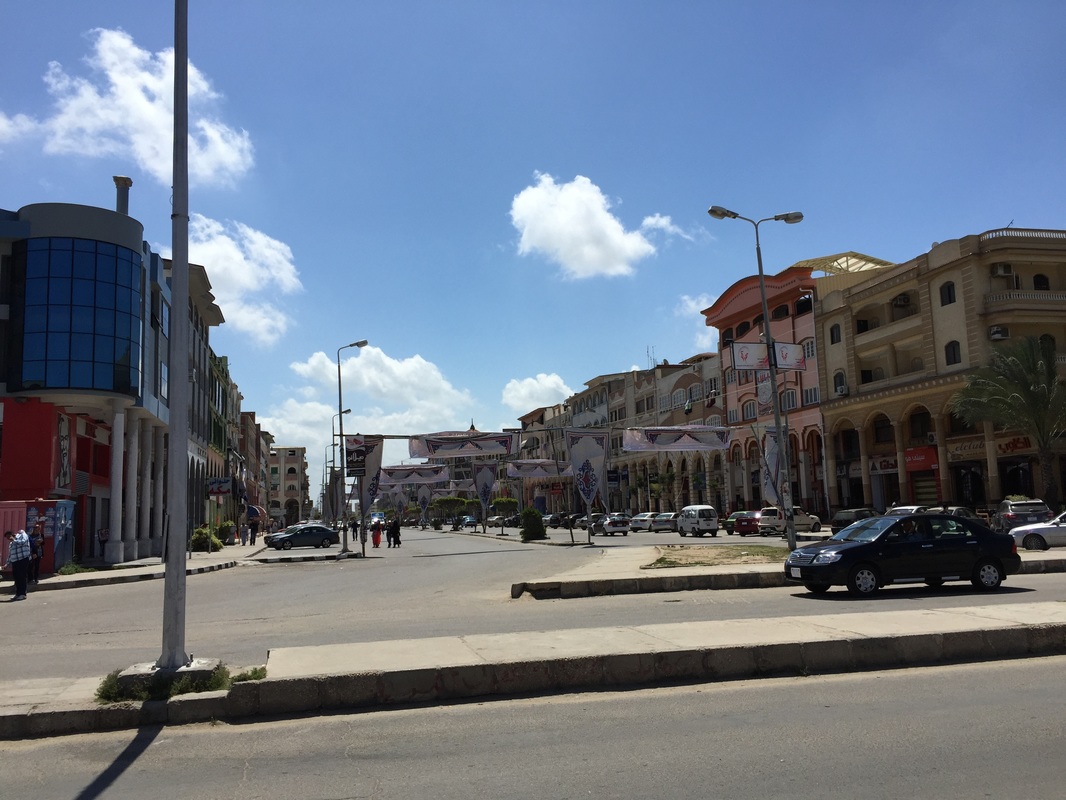
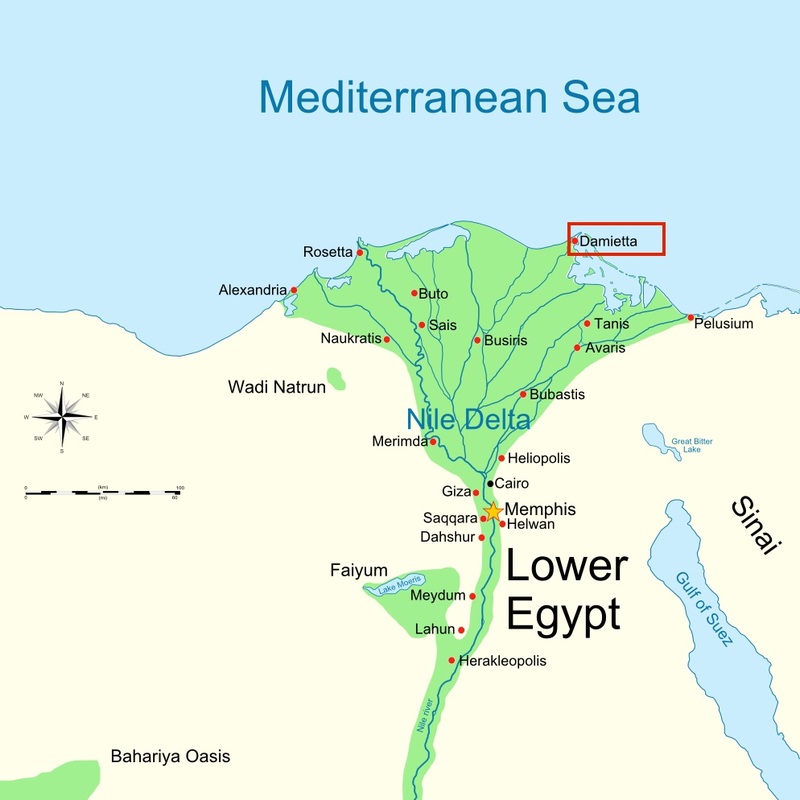
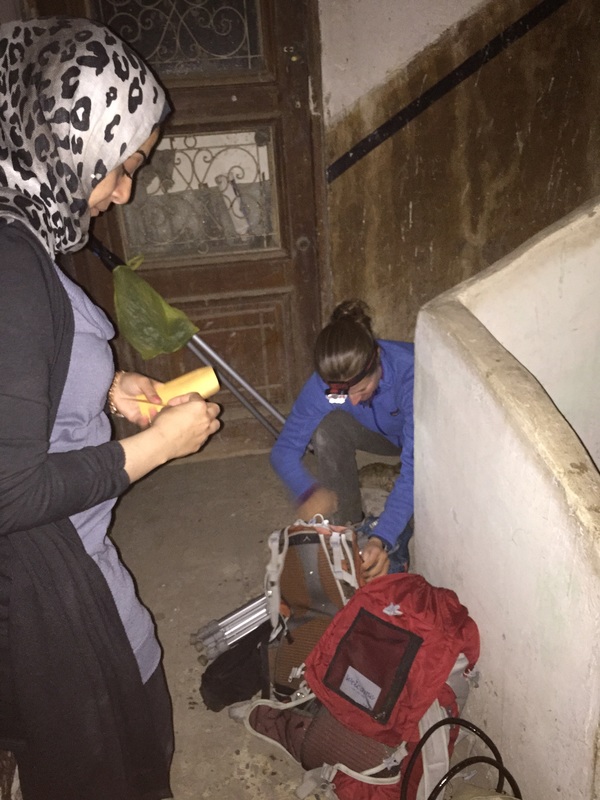
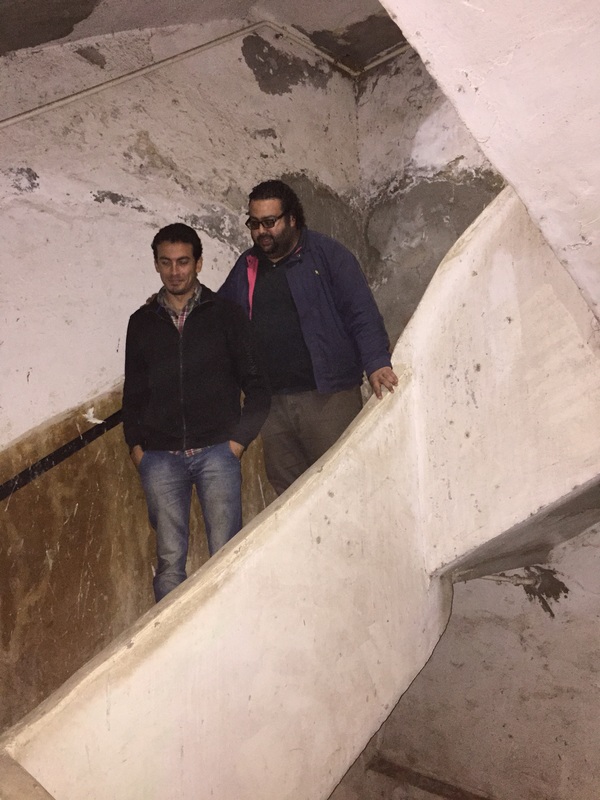
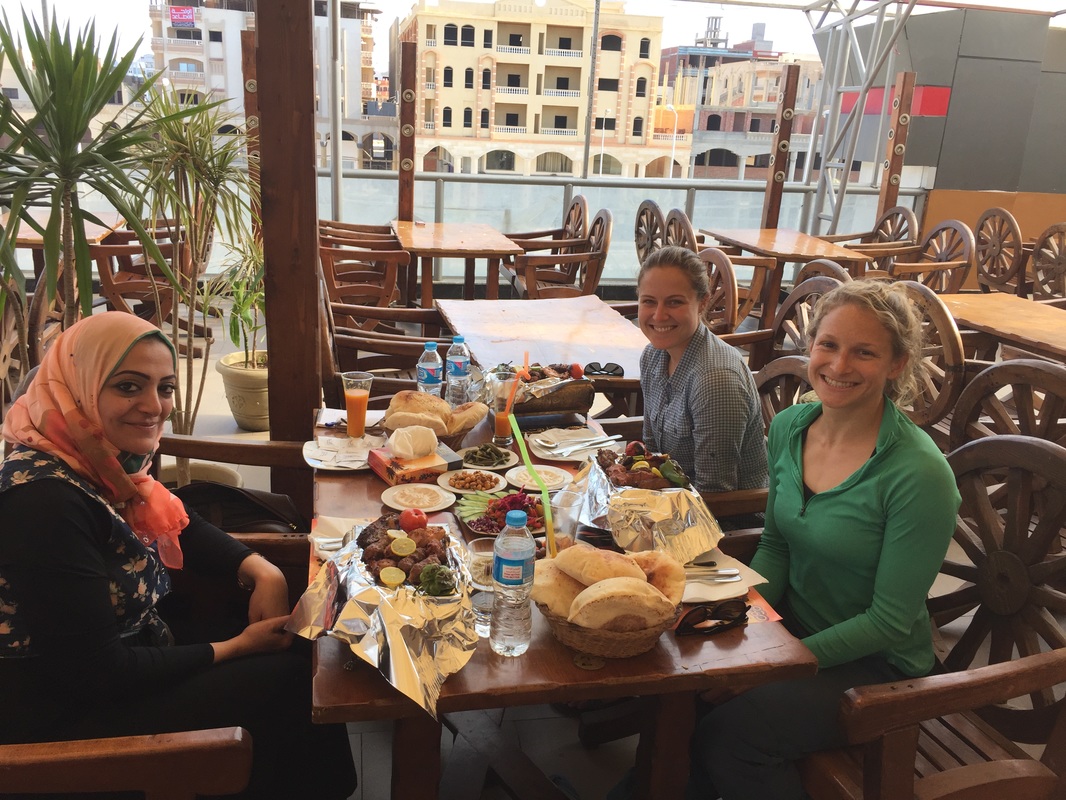
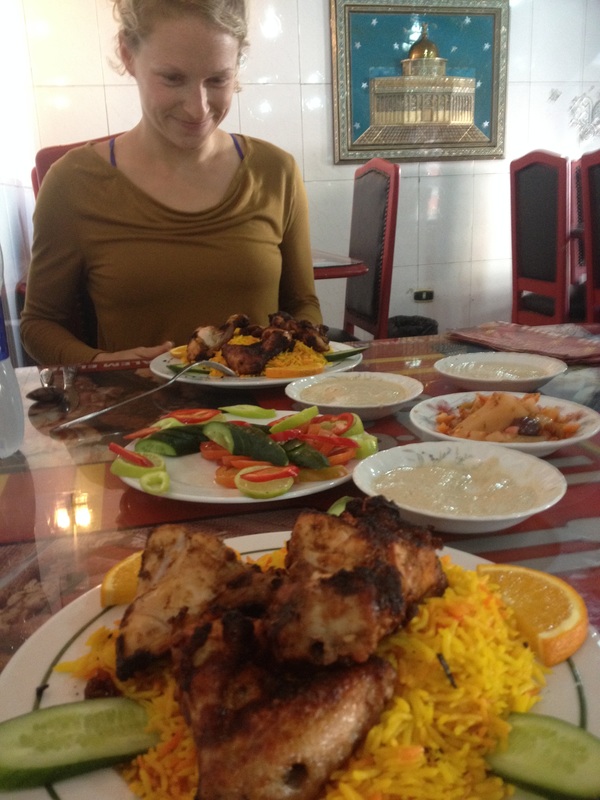
 RSS Feed
RSS Feed